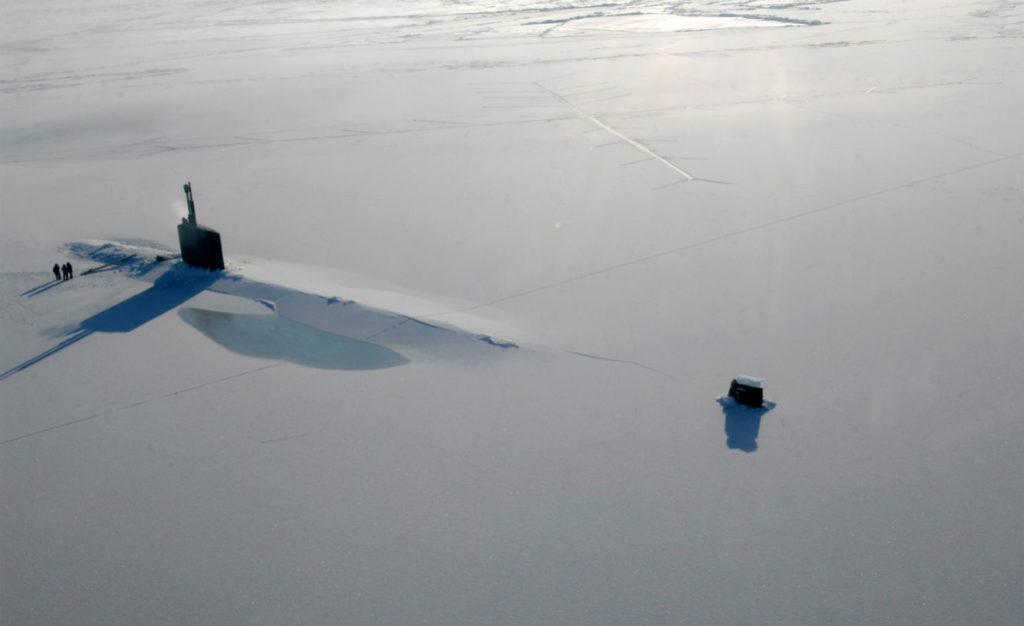Do Not Oversell the Russian Threat in the Arctic

When doing a cursory search of articles and commentaries about the current state of Arctic international relations, you would be forgiven if you were to think the Russians are preparing to launch a massive offensive against other Arctic states, particularly Canada. The oft-repeated narrative surrounding the Arctic is that the Russians are building up their northern military capabilities as part of their neo-imperial ambitions and to turn the Arctic into a sphere of geopolitical competition, tension, and conflict.
There is reason for this narrative to not only survive, but to grow in its sensationalism. Russia’s provocativeness, actions, and statements from Russian officials do little to allay fears. For scholars of foreign and defense policy, as well as casual observers, a potential conflict with the Russians in the Arctic would be of great interest. For media outlets, the idea of conflict in the Arctic continues to serve as click-bait, and so the sensationalism continues. The problem, however, is that very little of this narrative is grounded in reality.
The Arctic has certainly emerged as an arena of vast interest in recent years, and rightfully so. Northern climates continue to change and there are greater opportunities for access, as well as the possibility of resource wealth. As such, more attention has been paid to affairs in the circumpolar region. Covering approximately 4 percent of the Earth’s surface at 20,000,000 square kilometers with an estimated 4 million people, the Arctic is far more complex than a simple calculation about Russia’s investments in military technology. Arctic international relations are based on interstate cooperation, indigenous engagement, scientific and environmental collaboration, and is seeing an emerging global governance architecture through bodies like the Arctic Council designed to provide a forum for future cooperation, resource sharing and to ensure diplomacy, rather than conflict. This continues to be the predominant norm.
Despite the existing cooperative dynamics in the Arctic, there are reasons for concern and important historical lessons to bear in mind. The Arctic is not immune from geopolitics and other international political events, and it is still very much impacted by the international system’s anarchic structure and great power politics. Circumpolar relations involve multiple actors, including the eight Arctic states, Arctic-interested states, international institutions, indigenous groups, and NGOs. All are contributing to an increasingly complex Arctic political landscape. This complexity is leading to concerns over states’ intentions in the region, and how other states and institutions react.
Russia has been generating the most attention for its recent Arctic behavior, primarily due to the ongoing militarization of its Arctic territory and fears about whether Russia’s actions in Crimea, eastern Ukraine, and Syria might somehow foreshadow aggression in the north. Given the fact that Russia’s Arctic policy has included an expansion of permanent military forces, new military bases, new air force divisions, new military technologies, and massive military exercises, it is understandable that other Arctic states would be paying close attention to Russia’s Arctic moves.
However, the “Arctic conflict” narrative assumes that Russia wants to be an aggressor in the region. This line of thinking existed before Russia’s annexation of Crimea and its incursions into eastern Ukraine, but those events have sparked more debate about whether Russia’s international behavior is inherently aggressive and whether Russia might use the Arctic as another theater in a new Cold War. The Arctic is not immune to the rules of the international system and great power politics. It is thus highly unlikely that Russia would risk conflict with the United States and other NATO states in the Arctic. There is little to gain by doing so and conflict would disrupt the emerging balance of power in the Arctic. If Russia was to initiate conflict in the circumpolar region, it would unilaterally disrupt the existing cooperative framework and would yield no significant gains in either territory or influence based on what Russia currently enjoys in the Arctic. Instead, it makes far more sense to interpret Russian actions as defensive in nature, given the Arctic’s importance for Russia’s energy infrastructure, its nuclear deterrence strategy, its Northern Fleet, and the role a northern identity plays in Russian national pride. The Putin regime has used the Arctic as a means of demonstrating to Russians and to the rest of the world that Russia will defend its Arctic interests by any means necessary. The ongoing militarization of the region speaks more to Russia’s recognition of just how important the Arctic is for the Russian economy, and that as greater access to the region becomes possible with the shifting northern climate, Russia is seeking to increase its presence as a means of defending its territory and both its commercial and strategic interests.
The ongoing buildup of military resources in the Arctic by Russia and the subsequent response by other Arctic states is cause for concern and does pose a threat to the security and stability of Arctic relations. However, there is a vast difference between identifying emerging threats and the narrative that the Arctic is on the verge of war. The goal of Arctic states, and Arctic-interested states and organizations, continues to be cooperation, information sharing, and diplomacy. If a state is to threaten the emerging Arctic geopolitical framework for purely offensive purposes without any provocation or threat to its national interests, it would depart from the current reality of the region and would serve to hurt Russia’s interests rather than benefit them. In this light, it is best to stick to the status quo than trying to create conflict where there currently is none.
Robert W. Murray is the Vice-President of Research at the Frontier Centre for Public Policy and an Adjunct Professor at the University of Alberta. He is the co-editor of International Relations and the Arctic: Understanding Policy and Governance (Cambria, 2014).
Image: U.S. Navy, Petty Officer 1st Class Tiffini M. Jones

